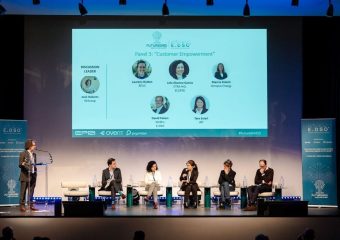IDEAS Platform: A strong call for consumer engagement in flexible energy demand [EUSEW Policy Conference]
Brussels, June 18 2015 – In the context of EU Sustainable Energy Week [1], energy stakeholders gathered yesterday in Brussels’ Charlemagne building for a unique event focusing on ideas to capture the potential of flexible demand.
Members of the I.D.E.A.S platform [2], the informal coalition promoting full demand-side participation in Europe’s electricity system, invited MEP Claude Turmes, Frauke Thies from Solar Power Europe, Patricia de Suzzoni from the Council of European Energy Regulators (CEER), Anne-Sophie Chamoy from Energypool and a large variety of stakeholders to an exchange on the underestimated potential of enabling energy demand response across Europe’s electricity markets. Managing energy demand necessarily involves creating flexibility services to adapt energy consumption in response to signals.
At present, many still ignore the manifold promises demand response holds for the security and sustainability of energy supply in Europe. IDEAS successfully seized this opportunity to demonstrate why realising the full potential of demand-side flexibility is essential and why it must be a priority action for the Energy Union, in order to design collectively an innovative energy paradigm for Europe’s energy transition.
Commissione Vice-President for an Energy Union, Maros Šefčovič, welcomed today’s debate in a recorded video message: ‘Your discussion today is of paramount importance and is very timely, I look forward to hearing its conclusions’. Šefčovič added ‘The public consultation on the new market design will allow us to signal to the market where we are headed when it comes to demand-side solutions, empowering consumers with more choices and integrating renewables into our grids’.
Betrand Deprez, acting Chairman of IDEAS, introduced the discussions by underlining that ‘IDEAS is about putting consumers at the centre of the energy system equation’. Frauke Thies (Solar Power Europe), working to further promote renewable energy integration, echoed this statement ‘Consumers and prosumers are becoming an active part of the energy system and are changing it from the bottom’. Participants agreed on the deep changes Europe’s energy mix is undergoing and discussed the substantial direct and indirect benefits of demand-response.
Speakers also highlighted the barriers to the realisation of flexibility services. In this regard, Patricia de Suzzoni (CEER) touched upon regulatory barriers ‘the flexibility market should be accessible to energy aggregators’ and technology barriers ‘smart technologies should be available for the smaller consumers and should not remain the privilege of larger industrial consumers’. De Suzzoni added ‘In the future, the roll-out of smart meters should be a key enabler of demand-side flexibility’. Anne-Sophie Chamoy (Energypool) argued that what demand-response requires is ‘the removal of market barriers and more investments’.
MEP Claude Turmes reiterated ‘We are in the middle of a disruptive change in the energy system’. Turmes urged the European Commission to include support measures for demand side flexibility in the upcoming Retail Energy Market Communication and also invited energy actors to take the issue of data protection as ‘dead serious’. Referring back to the EU’s efforts to clarify roles and responsibilities of the energy system, Turmes called for bringing consumers on board ‘We need smart citizens before we need smart meters’.
The live vote showed that participants were surprised to hear that only six Member States are currently actively engaged in enabling demand-response for consumers. It was clear that many expect the EU to be a driver for flexible energy markets with full access for consumers.
Notes to editors
[1] For more information on the EU sustainable energy week, please consult: http://www.eusew.eu/
[2] I.D.E.A.S is an informal coalition of green NGOs, industries and federations of energy technology providers. IDEAS works actively to promote demand-side participation at every level of a dynamic grid and energy markets, harmonised with full system needs at the low, medium and high voltage levels.
For further information contacts:
• Roland Tual : Roland.tual@smartenergydemand.eu
• Nicolle Raven: Nicolle.raven@esmig.eu
• Marjolaine Blondeau : marjolaine.blondeau@ecostandard.org







